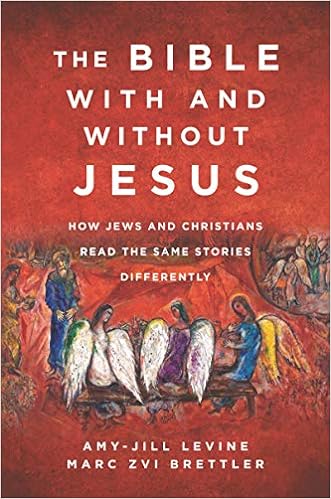|

book-cover art, Marc Chagall’s Abraham and the Three Angels (1966)
Features of ancient writing create even more ambiguity. Until the late first millennium CE, Hebrew writing contained only consonants; it had no vowels. If we were to imagine English written in this system, the word “red” would be written “rd.” But “rd” could also indicate read, reed, road, raid, rid, rad, ride, rod, ready, or redo. Context will almost always clarify what word “rd” represents.
A favorite exercise of Bible teachers is to ask students to read, in comprehensible English, the sentence GDSNWHR. Some take the optimistic “God is now here”; others opt for “God is nowhere.”
For a biblical example, the first word of Isaiah 9:8 (9:7 Heb.) in Hebrew is dvr, which may be vocalized as davar, “a thing, word,” or dever, “pestilence.” The Masoretes vocalized it as davar, yielding the translation “The Lord sent a word against Jacob,” while the Septuagint translators read dvr as “pestilence” and so translated it as thanaton (Greek for “death”). Both readings make sense in context. It is also possible that the Hebrew author was punning.
Ancient Hebrew and Greek texts also lacked punctuation marks. Psalm 116:15 could be rendered, “Precious in the sight of the LORD is the death of his faithful ones,” or “Is the death of his faithful ones precious in the sight of the LORD?” Psalm 121:1 reads, “I lift up my eyes to the hills— / from where will my help come”; the context may suggest that the sentence is a question: “Will my help come from the hills?,” and the answer is, “No, you’re looking to the wrong place.” Help will come from “the LORD, who made heaven and earth” (Ps 121:2).
But numerous Christian hymns take the statement as a declarative and then see nature as revealing the divine presence.
Punctuation also matters in the New Testament. A centurion tells Jesus, “Lord, my servant is lying at home paralyzed, in terrible distress” (Matt 8:6). Most translations then have Jesus state, “I will come and cure him.” However, given that in Matthew’s Gospel Jesus restricts his mission to Jews, the sentence could just as easily be taken as a question, “Shall I come and heal him?”
An example that illustrates the Jewish-Christian interpretive divide appears in how we punctuate Isaiah 40:3–4. As punctuated through the cantillation marks found in the Masoretic Text, Isaiah reads:
A voice cries out:
“In the wilderness prepare the way of the LORD,
make straight in the desert a highway for our God.
Every valley shall be lifted up,
and every mountain and hill be made low;
the uneven ground shall become level,
and the rough places a plain.”
In other words, God will build a road in the desert to facilitate the Jews’ return from Babylon.
The Gospel of Mark, however, opens as follows:
As it is written in the prophet Isaiah,
“See, I am sending my messenger ahead of you,
who will prepare your way; the voice of one crying out in the wilderness:
‘Prepare the way of the Lord,
make his paths straight.’”
John the baptizer appeared in the wilderness, proclaiming a
baptism of repentance for the forgiveness of sins. (Mark 1:2–4)
The Hebrew text speaks of a voice telling the people to build a road: “A voice cries out”—colon, quotation mark—“In the wilderness prepare the way of the LORD.”
The Gospel speaks of “the voice of one crying out in the wilderness”—colon, quotation mark—“‘Prepare the way of the Lord.’”
Here a dispute over punctuation is interwoven with a major theological issue.
let's eat grandma
This example shows how even such small matters as commas are significant, as illustrated by the sentences “Let’s eat, Grandma” and “Let’s eat Grandma.”
|